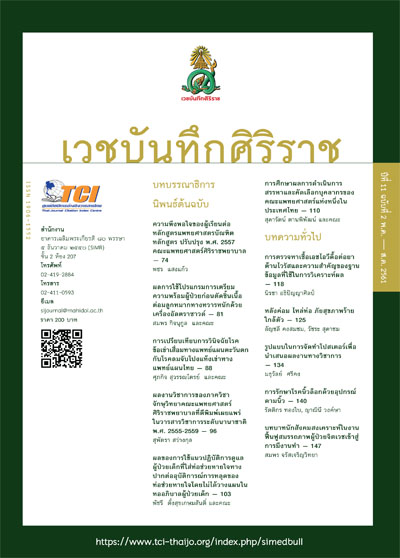ผลการใช้โปรแกรมการเตรียม ความพร้อมผู้ป่วยก่อนตัดชิ้นเนื้อ ต่อมลูกหมากทางทวารหนัก ด้วยเครื่องอัลตราซาวด์
Main Article Content
Abstract
Objective: To examine the efficacy of educational program for patients receiving transrectal ultrasound -guided prostate biopsy.
Methods: Samples of the study were patients who have investigated visit by transrectal ultrasound - guided prostate biopsy in 2015-2016 at Siriraj Hospital. This quasi-experimental study aimed to examine the efficacy of educational program for patients receiving transrectal ultrasound - guided prostate biopsy. Samples were randomly assigned into two groups: control group who were receiving usual care in 2014 (199 cases) and
experimental group who were receiving this individual educational program at privacy space and keep confidentiality in 2015-2016 (199 cases). Data collection was done with these five questionnaires including demographic case record form, pre-post education program preparedness, telephone monitoring record from, and daily self-record of behavior form.
Results: The results revealed that experimental group (2.01%) had lower cancel/postpone of transrectal ultrasound - guided prostate biopsy than control group (7.04%), with statistically significance (P = 0.016). After adjusting related factors including health care payment type, heart disease, hypertension, cerebrovascular disease, anti-coagulation drug, and previous operating experience, the results still found statistically significant difference between groups 4.74% (P = 0.031, 95%CI 5.03%; 0.97%-9.08%). The common causes of cancel/postpone of transrectal ultrasound - guided prostate biopsy in this study were included none/poor self-saline enema, poor controllable hypertension, and no hold/stop anti-coagulation drug before visit date. As a result, patients had to pay higher cost of care and also spend longer treatment period.
Conclusion: Efficacy of educational program for patients receiving transrectal ultrasound - guided prostate biopsy in this study was be proved. The results supported assumptions that the program could promote better self-care activities and decrease cancel/postpone rate of transrectal ultrasound - guided prostate biopsy. In addition, higher patients’ satisfaction and better willing to participating in this program were found and they resulting in lower anxiety as well.


